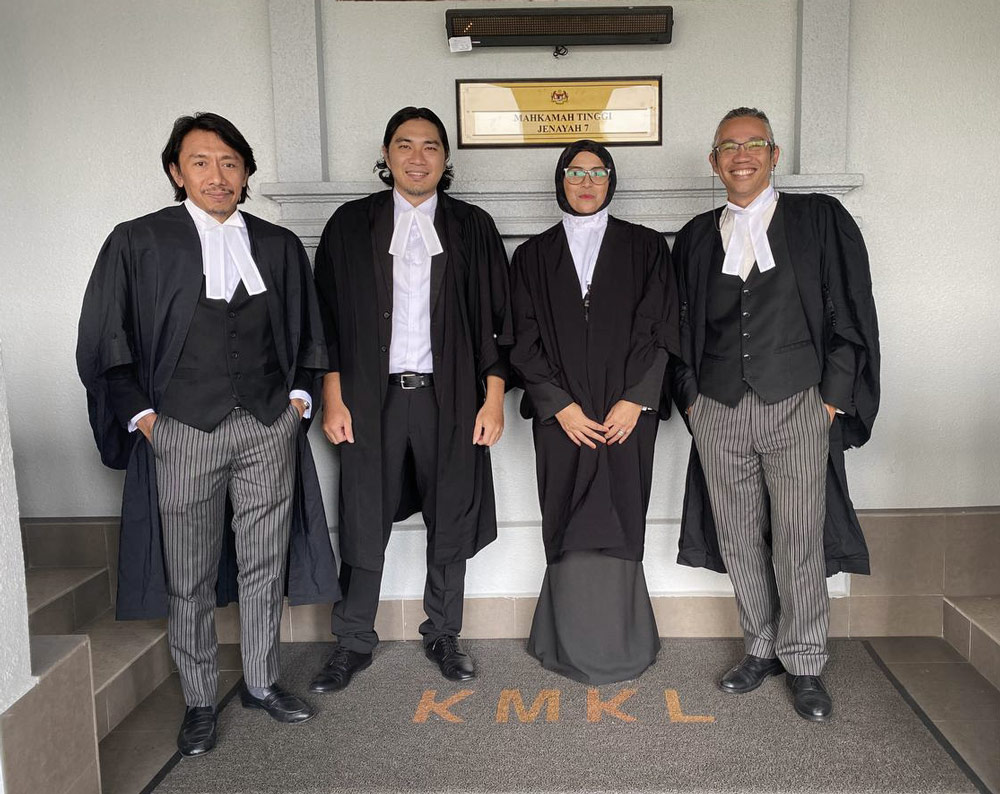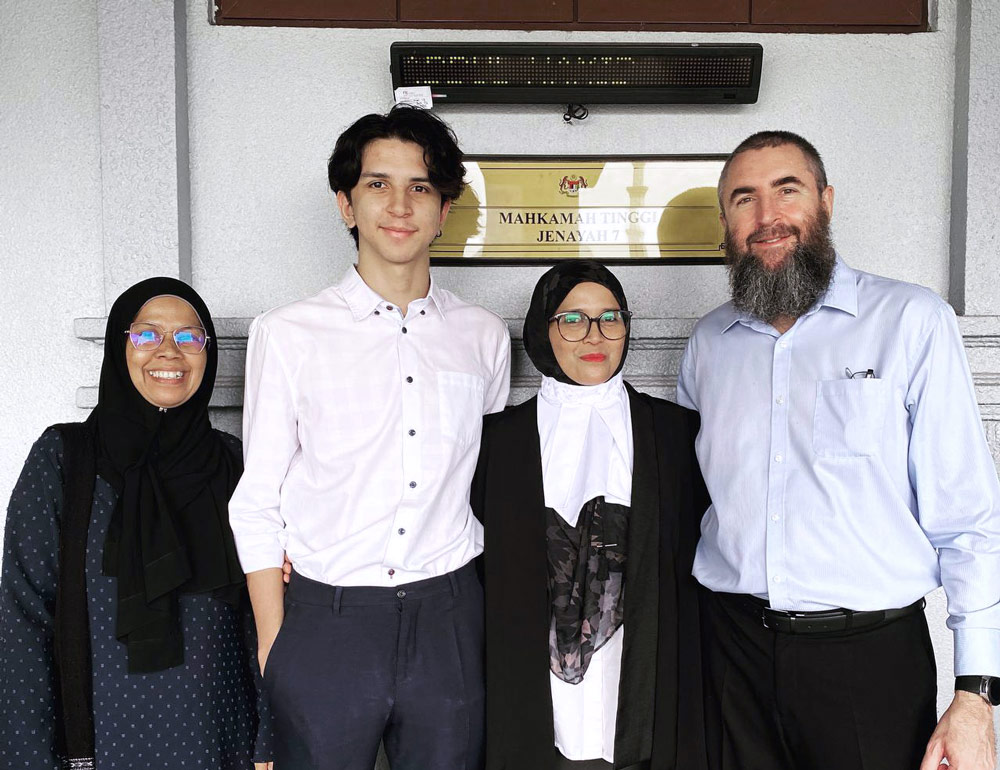On 5 May 2023, AmerBON’s Pupil-in-Chambers, Ms Azlina binti Abdul Aziz, was called to the Bar at the Kuala Lumpur High Court. We thank Mr Fahri Azzat, for moving Azlina’s call, and for yet another carefully crafted and thought-provoking speech.


Fahri Azzat’s speech is reproduced below:
May it please your Lordship,
Fahri Azzat for the Petitioner, Azlina binti Abdul Aziz.
The Petitioner is the daughter of Encik Abdul Aziz bin Hussein and Puan Hasnah binti Abdul Razak. They are not with us this morning. In attendance, however, is her husband and anchor, Mr Michael Cawley.
My lord, although the Petitioner arrived at the gates of law later in life compared to the usual petitioners here, her experience and apprenticeship outside the kingdom of law only served to refine her suitability and appropriateness inside of it. Having spoken with the Petitioner, I am convinced that we should not come to the law too early; and take law as a second degree instead of a first. The Petitioner’s father and her childhood had an important influence on her being before your Lordship today.
The Petitioner’s father was an officer in the army. He unfortunately suffered from schizophrenia. Due to ignorance and a lack of sensitivity to mental health issues in the 1970s, the Petitioner’s father suffered at the hands of the law as his condition deteriorated. In 1978, the Petitioner’s father was convicted for injuring an officer and sentenced to two years imprisonment. That resulted in him losing all his army benefits and pension. Therefore, from an early age, the Petitioner had a vicarious experience of the legal process. As a result of his conviction, during his lucid moments, he would encourage the Petitioner to take up the study of law and because he thought highly of him, exhorted her to “be like Karpal Singh”. Whilst she was in primary school, her father would enlist the Petitioner’s help to write appeal letters to the Ministry of Defence but to no avail.
As a result of having to take care of her father and her younger siblings, the Petitioner did not complete her Sijil Pelajaran Malaysia (SPM). At 18, the Petitioner married but was divorced 3 years later. I submit that her potential for legal practice was already apparent then. She acted for herself in the Syariah court proceedings and successfully sued for divorce pursuant to a taqliq and secured her custody application. Even though the Petitioner did not know it then, with her self-representation she had set her foot down the path of law.
She went to Australia to further her studies in business management in 1998 but ended up completing her business diploma in Malaysia in 2000 due to the economic crisis. In 2002, the Petitioner worked various jobs. In 2003, she married Mr Cawley. She lived in Australia until 2009 when they returned to Malaysia because Mr Cawley had work in Malaysia. During that time, she ran a human resource consultancy business and started a clothes business. It will become obvious to my lord by now that the Petitioner’s path to the law was far from the usual one.
The catalyst for the Petitioner’s decisive move to legal practice was another criminal case in 2016. This time it involved her son. He was charged under section 302 of the Penal Code, i.e. a charge of murder. Out of desperation, she hired a lawyer who turned out to be more flogged reputation than action.
It was fortunate therefore that the Petitioner was eventually recommended to my good friend, En Amer Hamzah Arshad and his colleague Mr Joshua Tay from Messrs AmerBON to take over the case. She was impressed with both these gentlemen. It was not simply the way they carried themselves but the class they exuded — “they were charismatic, clever and ethical but I just wish they spoke up more. Sometimes they spoke so softly!”
Two things that impressed the Petitioner were how En Amer and Mr Joshua steered away from descending to make adverse or insulting comments about her previous lawyer’s conduct and advice, despite him being entirely deserving of it. More importantly, she said they took the time and trouble to patiently explain to her the process, terminology, and what she could expect to happen. That sparked her desire to learn more.
This was what Amer related to me by text: “She took up law at UIA as a mature student because of her son’s case in order to better understand the legal issues surrounding her son’s case. The trial was before Nazlan. She attended the trial diligently. The son was acquitted and she has been following Joshua and myself for our trials in order to learn and gain experience. This is one of the calls which you just have to do. And I think you’re the right person for it.” My lord, I am not one to challenge En Amer’s assessment about such matters, which explains my attendance here this morning.
This brings me to my first quality of good character about the Petitioner: her tenaciousness. She persevered in applying to University Islam Antarabangsa Malaysia despite lacking SPM qualifications. She read up, inquired, and explored what she had to do to earn a place. Her research paid off and she successfully convinced UIA that they should allow her a place in the law faculty.
The second quality the Petitioner possesses that shows her good character is her maturity. Before taking up the study of law, as I mentioned, the Petitioner had run an HR consultancy service and then a clothes business. She said, through her businesses:
“I have had the opportunity to meet people from diverse backgrounds and learn about their attitudes.” In taking up other work and meeting many people, the Petitioner possesses a worldliness and wisdom about people, life, and the ways of the world that a young law graduate fresh out from university lacks.
We had a delightful conversation yesterday when we met up over barley and tea. That conversation of ours reminded me that the practice of law benefits more from those that come to the law later in life; those that have not just experienced but suffered the vicissitudes of life. Some countries only allow the study of law to be taken as a second degree, not a first. The older I get, the more I sense I see in this. Because what gets lost in this whole “law” business is that “law” is not an end in and of itself — the law is to facilitate, support, and allow “life” to flourish. That practice of law is not about profit per client, but about facilitating and encouraging the profit of life.
And from that conversation, I can assure my lord of the Petitioner’s maturity and thoughtfulness.
Her final quality that I will speak of is her genuine interest in helping others, especially in respect of criminal law, which she intends to practice after this. I hear this desire to help all the time, but I see little of it, especially among the young fresh lawyers. There is a lot of talk about helping others but the first thing they do is look for a place that pays them a lot for the privilege of grinding them down. Noble aspirations are worthless until they are materialised in an actual benefit to someone else.
The Petitioner feels she can carve her niche in criminal practice. She knows that she can not only do better than some so-called criminal lawyers but care better. It has been her experience the criminal lawyers she came across were more interested in scoring a fee than doing the work, which she found slipshod as well. She wants others to experience the warm, safe hand of a competent criminal practitioner who cares. The Petitioner mentioned how her desire to practice law is not about the money, but about reducing the number of people who get fleeced by lawyers more interested in fees than the case. Spoken with conviction and with history to support it, I believe the Petitioner. She has been volunteering with Teduhan Kasih in Sungai Buloh, a shelter and rehabilitation centre for male drug addicts with HIV/AIDS. She is currently an advisor with the Persatuan Pengasih Selangor. So she walks the talk.
My lord, at the end of our conversation, the Petitioner said to me, “All I hope after my call is to be a lawyer of use to others. So long as I can genuinely help someone out of their problem, I am happy.” I feel sure her admission to the profession will be a boon to her and to us. To the Petitioner, I will repeat her father’s injunction and say, “Be like Karpal Singh!”
In closing, the Petitioner would like to thank the following:
First, Mr Michael Cawley, her husband and anchor. She thanks him for having faith in her and always supporting her and her decisions.
Second, her parents and siblings made her strong, tough, and brave to face the world. A special thank you to her father who served as an inspiration to her journey to being an advocate and solicitor.
Thirdly, En Amer Hamzah, her mentor, and Mr Joshua Tay, her Master, who she has now known for about 7 years, sparking her latent childhood ambitions to be a criminal defence lawyer. She also thanks them and everyone at AmerBON for their professionalism, attitude, and charisma that has proven an inspiration to the Petitioner.
Finally, her lecturers in UIA encouraged her to follow through despite some difficult moments. She would not make it here if it were not for their encouragement.
With that, I submit the Petitioner possesses the requisite good character to be a fit and proper person to be called to the Bar pursuant to section 11(1)(b) of the Legal Profession Act 1976. I believe the documents filed thus far indicate that the Petitioner has satisfied the requirements in sections 10 (of being a qualified person) and 12 (in completing her pupilage period) LPA76.
I submit the Petitioner’s cause papers are in order and my learned friends will have no objections to them. I pray that the Petitioner be admitted and enrolled as an Advocate and Solicitor of the High Court of Malaya.



